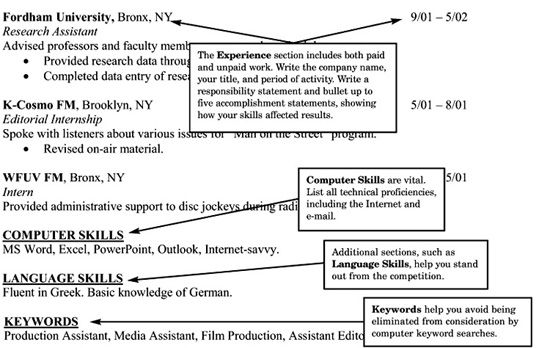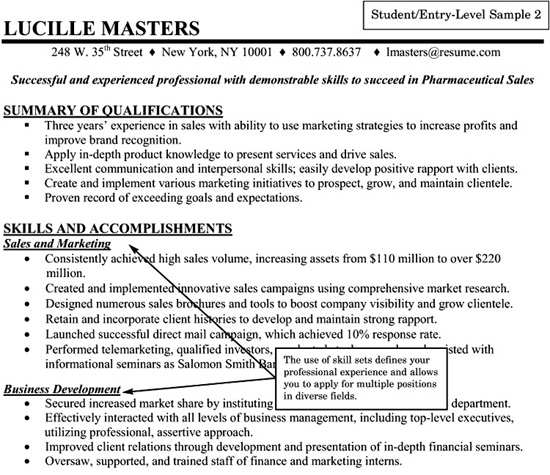The Resume.Com Guide to Writing Unbeatable Resumes (32 page)
Read The Resume.Com Guide to Writing Unbeatable Resumes Online
Authors: Warren Simons,Rose Curtis

Logan James Mines
, Cadillac, Quebec
Summers 2000 – 2002
Inventory Clerk
Inventory Clerk
Served as acting Inventory Manager when necessary.
■
Coordinated shipping and receiving of parts.
■
Communicated with suppliers to ensure accuracy and timeliness of orders.
■
Assisted employees with location of specific pieces.
■
Managed inventory levels.
W
ORK
E
XPERIENCE
Thalassa Howard Architects
Spring 2002
Intern
■
Played key role in client presentations by creating AutoCAD drawings and choosing samples.
■
Prepared premeasurements at work location.
■
Kept resource library systematic and up to date.
■
Performed basic office duties, including faxing, filing, and photocopying.
American Society of Interior Designers
1999 – 2002
Helped designers gather materials and ship packages to clientele.
■
Attended Member Conference held at Florida Southern College.
■
Created kitchen and bathroom blueprints for $2 million home.
■
Assisted in design and building of homes with Habitat for Humanity.
Every recent graduate has had some interaction with a computer during the course of his or her academic career. This includes experience with the Internet, e-mail, software programs, hardware, operating systems, and programming languages. Regardless of what position or industry you are targeting, always include your level of computer literacy, as this is a fundamental aspect of today’s work environment. Even if you feel that “everyone” has the same computer skills you do, list them—it can only help you.
COMPUTER SKILLS
Macintosh and PC; AutoCAD, Microsoft Office Suite, MS Windows, Internet, e-mail
COMPUTER KNOWLEDGE
Microsoft Office Suite (Word, Excel, PowerPoint, Access, Outlook)
Add additional sections if they relate directly to the position for which you are applying. If you know a foreign language, include your level of proficiency. For example, you can highlight your communication skills by creating a section dedicated to your foreign language skills.
FOREIGN LANGUAGE
Bilingual fluency in Spanish; Conversational proficiency in Italian.
Keywords are essential to Internet resumes as a way of listing alternative job titles or industry-specific words not already mentioned in the body of the
resume. Medium- and large-size employers use computer scanning software to scan and file resumes according to certain essential buzzwords. For additional information on keywords, see Chapter 7.
KEYWORDS
Editorial Assistant, Publishing, New Media, Administrative Assistant, Office Assistant, Secretary
KEYWORDS
Retail Sales, Sales Associate, Cashier, Stocker, Night Shift, Clothing, Customer Service






The Executive Resume
Executive resumes are designed specifically for senior-level professionals who are pursuing high-ranking positions in both the corporate and noncorporate sectors. You can use numerous formats to market the extensive responsibilities, accomplishments, strengths, and skills that define you as a seasoned professional, but regardless of the style you choose, all executive resumes should emphasize accomplishments, accomplishments, and more accomplishments.
You should use an executive resume if you:
■
Are applying for any junior management to senior-level professions
■
Have management experience and are seeking an upper-management position
■
Are working with executive recruiters
Executives and corporate officers are expected to have established reputations within their industries and therefore usually have two-page resumes with numerous sections defining their background. These sections include the executive profile (which is an enhanced Summary of Qualifications), work experience, education, affiliations, awards, computer skills, industry-specific proficiencies, professional licenses or credentials, technical training, and publications, presentations, patents, or all three. Obviously, these credentials will
be predicated on your professional experience and background, and you should not feel obligated to include any section that does not pertain to either the position or you.
These resumes reflect long-term achievements that often date back more than 20 years and consistently emphasize why the target organization can depend on you for leadership and growth. Here are a few rules governing the creation of an executive resume:
■
The format is usually chronological because executives generally have held progressively responsible positions in the same position or field. If you wish to highlight previous work more than your most recent experience, you may decide to use the functional skill sets within the combination format.
■
An executive usually will have professional affiliations that complement his or her professional work, and these affiliations usually are included.
■
Most executive resumes are two pages in length.
Achievements are the essential element of the executive resume, and when possible you should use quantifiable results, including dollar amounts or percentages. Hirers, however, also value strong character traits in an executive candidate, such as leadership and mentoring capabilities. Aim for a confluence of outstanding accomplishments and a variety of intangible talents. The following steps will walk you through the proper format, layout, and content to demonstrate why you’re the perfect candidate for the position.
The header provides prospective employers with your contact information. To create an eye-catching header, write your name on one line and your telephone numbers, street address, city, state, Zip Code, and e-mail address on the line below. Listing your pager or cell phone number is optional. Separate your name from your contact information by using a border. Here is an example:

For a step-by-step tutorial on formatting your header, see Chapter 5.